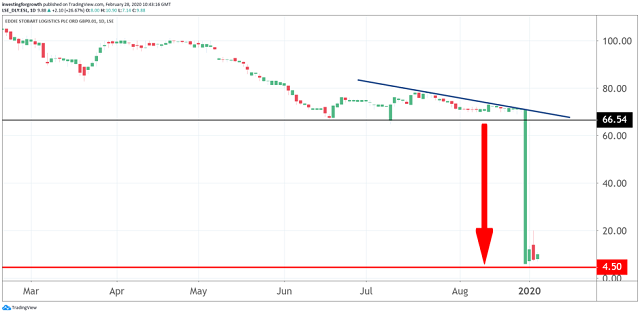Stockwatch: A lively stock option for risk lovers
After a review of accounting practices, profit warning and loss of CEO, here’s our analyst’s view.
28th February 2020 11:09
by Edmond Jackson from interactive investor
Trading again after a review of accounting practices, profit warning and loss of CEO, here’s what our companies analyst thinks of the shares.

What extent should you trust a sense of “a good underlying business” when sentiment is against and accounts look horrid from previous stewardship?
AIM-listed haulage firm Eddie Stobart Logistics (LSE:ESL) is a prime example: its delayed interim results to 31 May 2019 show a 26% revenue rise to £421.3 million, representing 6.4% underlying growth and a strong performance by The Pallet Network, which looks a good acquisition.
New customers have been won such as Tilda, Metsa and Lallemand, while contracts have been extended with Tesco (LSE:TSCO), Aldi and Mayborn. Two underperforming contracts have been exited but none significantly lost.
- How to steady your investments amid market turmoil
- Take control of your retirement planning with our award-winning, low-cost Self-Invested Personal Pension (SIPP)
There’s also good balance between retail, consumer, e-commerce and industrial revenue sources. E-commerce revenues grew 18% (helped by an acquisition) to represent 22% of group total. Notably, consumer revenue romped ahead 65% driven in part by new contracts with PepsiCo (NASDAQ:PEP) and Britvic (LSE:BVIC).
Another example of over-stated accounts
It was in this sense I drew attention to the shares last June as a potential “buy” if the stock fell further, given my unease on some issues. Since 2018, the stock had already halved to 70p despite two non-executive directors, including the chairman, each buying circa £10,000 worth just below 100p in April.
I was chiefly cautious that a hard Brexit could hit UK cyclical stocks, especially transportation, so ESL was one to watch for further weakness. Apparently, not even these two insiders were aware of an accounting fiasco soon to break: trading in ESL was suspended last August at around 71p, and the unaudited losses are now shown as hefty, even when adjusted.

Source: TradingView Past performance is not a guide to future performance
Operating profit is put at £11.6 million and pre-tax profit at £16.5 million, while a £169.2 million impairment charge raised the total continuing operations loss to £194.5 million. The re-adjustments didn’t translate into higher cash outflows, and a modest operating loss is targeted for the year to end-November 2019, though it could be higher subject to a fresh audit.
Once again, it seems overstatements – whether or not within the rules – get published in listed company accounts without check at the time. So, take the five-year table with a dose of salt, pending re-adjustments.
Increase in high-cost debt raises financial risk
Moreover, and in terms of future financial risk, end-May net debt has soared from £115.6 million to £158 million and was around £215 million as of last November. It looks, but is not made wholly clear, whether this includes £70 million additional liquidity approved by shareholders in December as part of a rescue by DBAY Capital (an Isle of Man investment group) for a 51% controlling stake.
Lest the economic environment worsens under the coronavirus and Boris Johnson’s resolve to pursue a hard Brexit (if EU talks don’t make enough progress by June), I am bothered by the upshot for ESL’s finances.
- 10 shares for the future?
- Coronavirus hammers Lloyds Bank shares and FTSE 100
- You can also invest in UK equities via ii’s Super 60 recommended funds. Click here to find out more
DBAY’s rescue loan entitles them to 18% interest of about £10 million a year ongoing for what is effectively preferred debt. Shareholders have to trust the situation that this does indeed “put ESL on a stable footing with a platform from which to develop” and DBAY has not been opportunistic to an extent that it cuts off its nose to spite its face – i.e. equity growth jeopardised by debt in a worse trading environment.
More positively, and if the coronavirus fears prove overdone, a latest index of UK consumer confidence has risen for a third straight month in February as people turn more optimistic after the Brexit impasse.
Stretched balance sheets aren’t unusual in logistics
At end-May 2019 there were £60.6 million of negative net assets, even when propped by £125 million goodwill/intangibles. While hefty near-term trade payables/receivables broadly balance each other, near-term debt tipped the current ratio to 0.87. There’s quite a parallel with peer Wincanton (WIN), and such situations can thrive with fair trading, but it emphasises what cash ESL can generate. This did at least improve from £3.4 million absorbed in the first half 2018 to £6.7 million generated in first-half 2019.
However, such balance sheets are partly a result of easy money and other stimulus measures since the 2009 crisis, which may not have similarly supported the economy if offices/factories/schools have to shut – in a worse-case viral situation.
Implicitly, DBAY reckons it has established a footing for ESL, but the stock market’s reaction – pricing ESL initially at around 13p on re-listing, which dropped to 4p, bounced back and is currently around 6.5p – shows it justifiably regarding it as a stock option.
| Eddie Stobart Logistics - financial summary | |||||
|---|---|---|---|---|---|
| year ended 30 Nov | 2014 | 2015 | 2016 | 2017 | 2018 |
| Turnover (£ million) | 347 | 497 | 570 | 624 | 843 |
| Operating margin (%) | 4.8 | 4.5 | 4.7 | 3.0 | 3.5 |
| Operating profit (£m) | 16.6 | 22.5 | 26.8 | 18.8 | 29.2 |
| Net profit (£m) | 4.4 | 11.5 | 9.0 | 3.9 | 16.2 |
| Reported earnings/share (p) | 1.3 | 1.3 | 2.5 | 1.2 | 4.4 |
| Normalised earnings/share (p) | 1.4 | 1.9 | 3.0 | 5.5 | 5.4 |
| Earnings per share growth (%) | 36.4 | 54 | 84.8 | -1.7 | |
| Operating cashflow/share (p) | 8.5 | 4.5 | 4.9 | 5.8 | -0.9 |
| Capital expenditure/share (p) | 4.4 | 2.1 | 2.3 | 3.0 | 4.8 |
| Free cashflow/share (p) | 4.1 | 2.4 | 2.6 | 2.8 | -5.7 |
| Dividend per share (p) | 5.8 | 6.3 | |||
| Covered by earnings (x) | 0.9 | 0.9 | |||
| Cash (£m) | 8.4 | 4.1 | 14.1 | 11.9 | 5.2 |
| Net debt (£m) | 191 | 170 | 166 | 110 | 160 |
| Net asset value/share (p) | 18.7 | 21.6 | 24.5 | 59.3 | 62.1 |
| Source: historic Company REFS |
Diversification into an AIM-listed investing company
The interims’ statement cites “raising funds prior to the end of May 2020 to co-invest alongside DBAY in private equity deals across Europe.” This bothers me in several regards, whereas with the high-cost debt injected, shareholders have to trust that DBAY knows what it is doing and that interests are sufficiently well-aligned.
Maybe it’s a reflection of how, by May, some debt restructuring will be essential anyway, but, unless the full-year 2019 results and outlook statement are more positive than expected, then I can’t see the stock rising enough in the next three months to avoid hefty dilution.
If the investment company plan has merit, it would seem more sensible for DBAY to show first what they can achieve, overseeing ESL with a director on the board, re-rate the stock and raise capital at a higher price.
Secondly, an investment company goal can have mixed upshots. ESL’s current appeal for stock buyers is honing a focused business into better shape – one with a longstanding heritage of customer goodwill – thereby offering leverage for stock recovery with restoration of dividends.
If the prospect becomes diluted, and also with a spread of other interests, then it is possible that dividends may not amount to much (according to DBAY’s agenda) and the assets trade at a discount (where the balance sheet is already poor).
So, the plan to become a vehicle for DBAY’s private equity ambitions is pretty hard to judge at the outset. Typically, this kind of stock trades at a premium when a bull market coincides with economic expansion, and there’s appetite for unlisted investments. Currently, we are in a jaundiced “post-Woodford” phase.
Yet there is still a speculative “buy” case
On a five to ten-year view, current buyers of ESL could make multiples of their outlay – from a volatile single-figure penny stock capitalised at around £30 million. There are real financial risks to overcome, and I would prefer to see big ideas postponed until ESL is shown to be generating enough cash to have retired that costly debt. In the short term, it is also possible that risk aversion gets entrenched in financial markets, leaving the likes of ESL to the whims of penny stock punters.
A balanced view would be to await more evidence because you can’t currently quantify any intrinsic value for this stock – it all rests on intangible belief in a sound underlying business that rescuers DBAY can hone, their interests being aligned satisfactorily with the other 49% of shareholders. It would therefore be harsh to rate the stock “Avoid” unless steeling for a worse-case scenario. Mind, that with 51%, they could then call most shots.
If you fancy a gamble, then take a small position from 8p currently and trade according to newsflow. For risk lovers: Buy.
Edmond Jackson is a freelance contributor and not a direct employee of interactive investor.
These articles are provided for information purposes only. Occasionally, an opinion about whether to buy or sell a specific investment may be provided by third parties. The content is not intended to be a personal recommendation to buy or sell any financial instrument or product, or to adopt any investment strategy as it is not provided based on an assessment of your investing knowledge and experience, your financial situation or your investment objectives. The value of your investments, and the income derived from them, may go down as well as up. You may not get back all the money that you invest. The investments referred to in this article may not be suitable for all investors, and if in doubt, an investor should seek advice from a qualified investment adviser.
Full performance can be found on the company or index summary page on the interactive investor website. Simply click on the company's or index name highlighted in the article.
Disclosure
We use a combination of fundamental and technical analysis in forming our view as to the valuation and prospects of an investment. Where relevant we have set out those particular matters we think are important in the above article, but further detail can be found here.
Please note that our article on this investment should not be considered to be a regular publication.
Details of all recommendations issued by ii during the previous 12-month period can be found here.
ii adheres to a strict code of conduct. Contributors may hold shares or have other interests in companies included in these portfolios, which could create a conflict of interests. Contributors intending to write about any financial instruments in which they have an interest are required to disclose such interest to ii and in the article itself. ii will at all times consider whether such interest impairs the objectivity of the recommendation.
In addition, individuals involved in the production of investment articles are subject to a personal account dealing restriction, which prevents them from placing a transaction in the specified instrument(s) for a period before and for five working days after such publication. This is to avoid personal interests conflicting with the interests of the recipients of those investment articles.